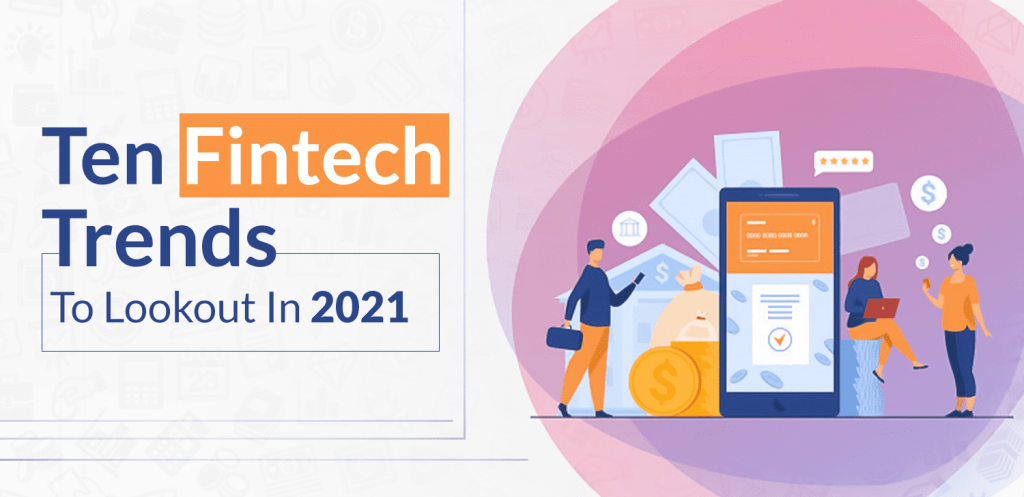
Financial technology or FinTech are undergoing a rapidly optimistic shift in current days.
Fintech is now formally a disruptive force that impacts any other convention and industry that it touches. Fintech is transforming how things have worked so far, with the aid of some of the most advanced internet principles, instruments, and innovations such as artificial intelligence, machine learning, Big Computer, data science, deep learning, Blockchain, and far more.
For those who didn’t know, the fintech industry was already worth $4.7tn, as per Goldman Sachs. Over the decades, we have seen fintech plunging into new directions and helping individuals address different lifestyle and business issues. And analysts are expecting this year that this would only go further. We have evaluated and curated some Fintech development trends for the year 2021 from our insights and experience. Let’s get to know what they will be.
So without any further ado, let’s get straight onto the point.
Top 10 fintech trends to watch-out in 2021

1. Voice search
The vision is voice searching. In our houses and offices, many of us already have a digital assistant throughout the context of smartphones, headphones, smart gadgets, and much more. The usage of electronic assistants worldwide was close to 3.25bn in 2019 itself. To search for some stuff, almost 72% of people in the US use voice search. And so far as banking or finance is involved, Fintech applications may implement voice search to conduct credit balance assignments, delinquent, due date, request statements, trigger service requests, review investment market conditions, pull it up insurance plans and policies, and much more. Fintech companies for ads and campaigns could also use voice search by leveraging unique keywords.
2. Artificial Intelligence
AI is expected to will banks’ operational costs by 22 percent around 2030, as per Autonomous Study, indicating banking institutions will have savings of $1 trillion. Nonetheless, it can be daunting to step towards this perspective. Banks do not have a host of AI-skilled specialists, like many global employers. Being able to function with unstructured data, AI can handle rising cybercrime events, including risks of financial fraud. With the most powerful client service software using intelligent systems such as chatbots, Artificial Intelligence seems to have become prominent. FinTech institutions would not be an exception, facilitating faster transactions and delivering the feasibility that consumers are searching for.
3. eWallets
Digital wallets are updating traditions in silence. The idea of digital wallets may have been what came to the aid for transactions in challenging times such as the pandemic where connection to the outside world and people was minimal. We predict that this pattern would only grow significantly in the coming months as individuals find it increasingly convenient to use one wallet to make purchases across multiple platforms. With reimbursement and cash returns becoming easier on wallets, it only provides consumers with comfort.
4. Reg tech
The finance sector is a competitive marketplace, and Reg-developments Tech’s in FinTech require simultaneous growth. This shows emerging technology solutions that strengthen regulatory processes and coordinate them. Reg-Tech has grown concerning the highest institutional need that has arisen from the massive increase in enforcement costs. Reputable financial players, technology companies, and policymakers will work together to implement new regulatory technologies, but they need time to develop.
5. RPA
RPA has indeed appeared across fintech domains at substantial levels, but you and we’ve already formed interaction with artificially smart systems consisting of autonomous decision-making. Even more automation throughout the fintech industry is expected in the months and years to come to maximize performance and prevent the proliferation of mistakes in databases and procedures. The workforce will be used for tremendous accomplishments. The computers will take good care with some of the most repetitive processes, such as customer onboarding, security checks, monitoring, compliance, and much more.
6. NeoBanking
Competition causes a need to differentiate between neo-banks. The next fintech companies deliver much more than debit cards, from mobile-based financial advice and credit creation to niche-focused channels. Basic testing and. The portion of this trend would come from non-FinTech organizations with a settled customer or current workforce that really can benefit from banking service. Also, providers of business cost handling solutions are adopting complete business banking services that include cash flow credit lines, savings accounts, and enterprise cards.
7. Cybersecurity
For many fintech firms, these were likely to become a priority even though potential challenges are waiting every day to exploit the software vulnerabilities of enterprises, consumers, and their computers. Months and with it. Throughout the upcoming weeks, financial services will go on total with the most sensitive data and information such as credit balance, assets, money’s worth, and data, cybersecurity. In some ways, fintech also integrates IOT, where computers connect. In such instances, hackers can manipulate and render ruthless entries into these systems. And that’s why, for key market players and other businesses, cybersecurity would be on the priority position of to-do.
8. Blockchain
A global facelift of financial structures is promised by Blockchain. It provides not only modern technologies but also a fully decentralized finance paradigm that focuses on removing centralized processes. Thus far, the philosophy of Blockchain has driven the development of different online P2P (peer to peer) financing platforms that allow more decentralized financial transactions to occur. Some countries also plan to create their domestic cryptocurrencies, so there may be a gradual change from money to crypto. Intending to reduce costs and enhance internal procedures, banks are now pursuing blockchain technology.
Read More: Discover how partnering with a P2P lending platform development company can revolutionize your fintech business by streamlining lending processes and enhancing user experiences.
9. Conversational Banking
There are indeed individuals who choose texts and messages over calls as technology links more individuals. This trend is also expected to catch up in the Fintech room. Conversational banking is just what we consider this deployment. Individuals use fintech services by interacting with a bot, communicating through emails, texts, and tickets with a person, and then using the necessary assistance. This communication could indeed occur over network-operated text messages, instant messages, social media sites, emails, in-app chat systems, and more. This will be a big part of the direction as banks and fintech firms aim to humanize their products and services.
10. Biometric systems
The required security steps should be taken by each financial institution, and the biometric system is a great way to approach security to another level. It provides customers the assurance that their data is protected. Nonetheless, underneath the pressure of conditions, the biometrics industry is currently undergoing significant changes. It is expected that biometric sensors that require physical contact will decline in popularity. Through the evolution of biometric identity authentication technologies, contactless devices will take over the touch-based fingerprint reader sector.
Conclusion
So, these are some of the trends that we know are going to become popular in 2021. The financial industry is expanding sharply. Concerning customer requirements, the fintech trends we have listed have already been developed. They help suppliers provide more outstanding financial capabilities that enable more extensive economic availability of data, faster processing of transactions, improved transparency, and better customer care.
If you are looking for top-fintech solutions, then contact us. Also, let us know other fintech trends
as per your expertise in a comment below.
For more, visit www.matellio.com.




